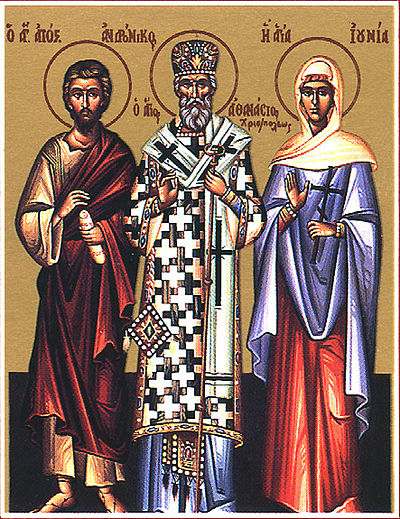How do we know if Junia, the only named female apostle named in the New Testament, was actually a woman?
For my Jewish friends, this may not be a question keeping you up at night. But if you knew that most of the women of the Christian Bible considered themselves to be Jewish, and that many of them held positions of leadership in the early church, and then you discovered that their very existence was covered up, perhaps you’d have a few moments of insomnia. This is an injustice in Jewish as well as Christian history.
Her true identity makes a big difference in the debate over whether women should currently hold positions of authority in the Catholic and many Protestant denominations. This subject has real consequences in the real world.
Most Christians I meet have never heard of Junia and when I tell them that she’s in plain sight, sitting there quietly in the New Testament (Romans 16:7), they run to their Bibles to have a look-see. Then it gets weird and confusing. Some translations use the male form of the name: “Junias.” Others do not. Some bibles reference the two names using footnotes. None of them explain what’s going on here. So was Paul talking about a woman apostle or not?
It’s time to answer this question once and for all. In preparation for writing my historical novel Junia: The Forgotten Apostle, I read everything I could lay my hands on regarding the biblical figure. After careful analysis, I came to the conclusion that her name had been altered. I also discovered a blog that describes how this change in translation came about. It’s the easiest evaluation of the facts that I’ve run across. I highly recommend following Brant Clements’ six part series outlining the deception. He also provides a comprehensive list of which bibles use the latest research with the correct spelling and which do not. Each section of the series is fairly short and to the point so don’t be scared. Go ahead click the links below. You’ll be glad you did.


Robin, thank you for this fascinating post and great visual! I appreciate the links, which I plan to explore after I fulfill some pressing responsibilities.
Although this is not a direct reply to the post, I’d like to mention that I happen to think that Priscilla, whom you would know as the Christian woman whose husband was Aquila, is a viable candidate for author of the N.T. book of Hebrews.
Instead of following the usual pattern for beginning a letter, Hebrews begins with the word “God” where the name of the author of a letter would usually appear, but it does not list addressee(s) or give an opening blessing. The word “God” turns out to be the beginning of a well-organized essay (not following the “pigtail” transitions to new topics that are characteristic of Paul’s letters). So Hebrews does not begin with the customary opening of a letter, but at the end, it closes with greetings to particular persons, as 1st-century letters did.
I suspect that if the author were Priscilla, she simply skipped the usual opening of a New Testament-era letter, which would have identified her as a woman, and jumped directly into the teaching. Thus the beginning could easily have been her tactic intended to avoid prejudices against women, particularly against women teaching, and going straight to the teaching itself.
Best,
Lawrence Mykytiuk
Thank you for your tangential comment! Just today I decided that my next post will be about Priscilla’s house in Rome. Although I am aware of the scholarship related to Priscilla as the possible author of Hebrews, I will have to wait for a future post to present the evidence.
There are so many interesting facets to these historical and literary women. I will never run out of subject matter!
May 13, 2014
Hi Robin,
I am so pleased that you are interested in the case for Priscilla’s authorship of Hebrews. That is a topic I have researched and written about. You can find several of my published articles about Priscilla on Wiley Clarkson’s website, http://www.wherethespiritleads.org. My book is “Priscilla’s Letter: Finding the Author of the Epistle to the Hebrews.” I hope you will reference my articles and find them of interest.
Ruth
Ruth,
I’m already familiar with your work so getting a note from you is like hearing from a celebrity! What can I say. Biblical scholars are my rock stars. Before I can delve more deeply into Prisca’s writing career, I need access to my personal library back in the states. I’m moving back this summer and I’m looking forward to cracking open your book to puruse my notes once again.
Robin